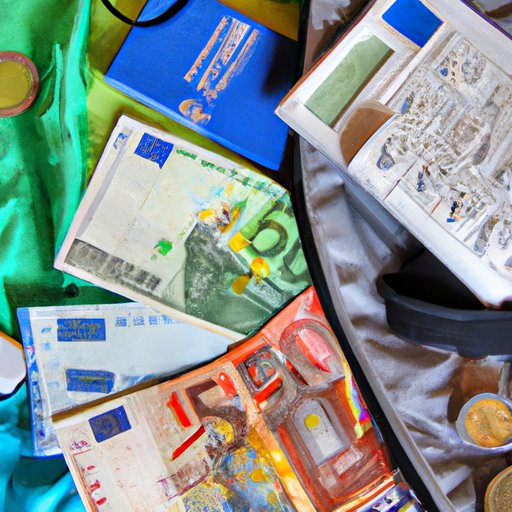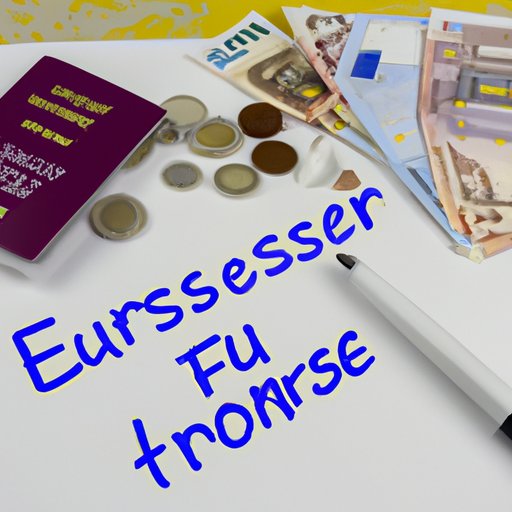Introduction
A trip to Europe has long been a dream for many people. From the ancient ruins of Rome to the stunning landscapes of Scotland, Europe offers something for everyone. But with its reputation as an expensive destination, it can be hard to determine how much a European vacation will cost.
A Breakdown of Typical Costs on a Trip to Europe
There are several costs to consider when planning a trip to Europe. These include airfare, accommodation, transportation, food and drinks, and sightseeing activities. Here’s a closer look at each:
Airfare
The cost of airfare will depend on the airline, the class of ticket, and the route you’re traveling. According to research from Skyscanner, the average price of a round-trip flight from the United States to Europe is about $1,000. However, this can vary widely depending on the specific route and time of year.
Accommodation
Accommodation costs will also vary depending on where you stay. Hotels in major cities tend to be more expensive than those in smaller towns. Airbnb is another option, which often offers competitive rates. According to a study by Skyscanner, the average cost of a hotel room in Europe is around $100 per night.
Transportation
If you plan to travel between countries, you’ll need to factor in the cost of transportation. Train tickets can range from just a few euros for shorter trips to hundreds of euros for longer routes. Bus tickets are usually cheaper, but they can take longer. If you’re visiting multiple cities, you may want to consider purchasing a rail pass, which can save you money in the long run.
Food and Drinks
Eating out in Europe can be expensive, especially in major cities. The good news is that there are plenty of budget-friendly options, such as street food and local eateries. According to Numbeo, the average cost of a meal in Europe is around $15. This can vary depending on the type of restaurant and city, so it’s best to do some research beforehand.
Sightseeing Activities
The cost of sightseeing activities can also add up quickly. Many museums and attractions offer discounts for students, seniors, and children. You can also take advantage of free walking tours or explore the city on your own. According to a survey by TravelBird, the average traveler spends about $25 per day on attractions and activities.

How to Save Money on Your Trip to Europe
While a trip to Europe can be expensive, there are plenty of ways to save money. Here are some tips for stretching your budget:
Research Deals and Discounts
Do some research before you book to find the best deals and discounts. Airlines, hotels, and tour operators often have special promotions or discounts for certain dates or locations. You can also search online for coupons or vouchers.
Consider Budget Accommodations
Staying in a hostel or Airbnb can be a great way to save money on accommodation. Hostels are often cheaper than hotels and offer shared rooms, while Airbnb offers private rooms and apartments at competitive prices.
Book Flights and Hotels in Advance
Booking your flights and hotels in advance can help you save money. Airlines and hotels often offer discounted rates for early bookings. For last-minute bookings, you may be able to find deals on sites like Lastminute.com or Expedia.
Use Public Transport
Public transportation is often cheaper than taxis and can be a great way to get around. Cities like London and Paris have extensive networks of buses, trains, and trams. You can often purchase tickets in advance for a discounted rate.
Take Advantage of Free Attractions
Many cities have free attractions, such as parks, galleries, and public squares. Exploring these areas can be a great way to save money while still experiencing the culture of a new place.

Budgeting for a Trip to Europe
Budgeting is key to ensuring you don’t overspend on your trip. Here are some tips for budgeting effectively:
Set Realistic Expectations
It’s important to set realistic expectations for your trip. Think about what activities you want to do and how much money you can afford to spend. This will help you set a realistic budget.
Estimate Total Costs
Once you’ve set your budget, estimate the total cost of your trip. This includes airfare, accommodation, transportation, food and drinks, sightseeing activities, and any other expenses. Be sure to factor in currency exchange rates if you’re traveling to multiple countries.
Allocate Funds Appropriately
Once you’ve estimated your total costs, allocate funds appropriately. Determine how much you can afford to spend on each category and stick to it. Consider setting aside a portion of your budget for unexpected expenses.
Track Spending
It’s important to track your spending while you’re on your trip. Carry a small notebook or use a budgeting app to keep track of your daily expenses. This will help you stay on track and adjust your spending as needed.
Prepare for Unexpected Expenses
Unexpected expenses can quickly add up. It’s a good idea to prepare for these by setting aside a portion of your budget for them. This could include extra transportation costs, medical expenses, or emergency repairs.

How to Estimate the Cost of a Trip to Europe
Estimating the cost of a trip to Europe can seem daunting, but it doesn’t have to be. Here’s a step-by-step guide to help you get started:
Gather Information
Start by gathering information about the places you plan to visit. Research typical accommodation and transportation costs in each location. Look for deals and discounts on flights, hotels, and activities.
Calculate Flight Costs
Next, calculate the cost of your flights. Compare prices for different airlines and routes. Factor in additional fees such as baggage allowance, seat selection, and priority boarding.
Estimate Accommodation Costs
Estimate the cost of accommodation in each location. Consider both hotel and Airbnb options. Research discounts, such as student discounts or loyalty programs.
Factor in Transportation Costs
Factor in the cost of transportation between cities. Consider both train and bus tickets. If you’re visiting multiple cities, you may want to purchase a rail pass.
Account for Food and Drink Expenditures
Food and drink can add up quickly, so it’s important to account for these expenses. Research average prices for meals in each location. Consider budget-friendly options such as street food or local restaurants.
What is the Average Cost of a Trip to Europe?
The average cost of a trip to Europe varies depending on factors such as length of stay, destinations visited, and type of accommodation. According to a survey by TravelBird, the average cost per person for a one-week trip to Europe is around $2,500. This includes airfare, accommodation, transportation, food and drinks, and sightseeing activities.
The average cost can be impacted by factors such as the time of year, type of accommodation, and destinations visited. For example, popular cities like London and Paris tend to be more expensive than smaller towns. Summer months are usually pricier than winter months, and luxury accommodations will cost more than budget options.
There are a number of ways to minimize costs on a trip to Europe. Research deals and discounts, consider budget accommodation options, book flights and hotels in advance, use public transportation, and take advantage of free attractions.
Conclusion
A trip to Europe can be an expensive endeavor, but it doesn’t have to break the bank. With careful planning and budgeting, you can enjoy all the sights and sounds of Europe without breaking the bank. By researching deals and discounts, considering budget accommodations, and taking advantage of free attractions, you can save money and maximize your experience.
(Note: Is this article not meeting your expectations? Do you have knowledge or insights to share? Unlock new opportunities and expand your reach by joining our authors team. Click Registration to join us and share your expertise with our readers.)
